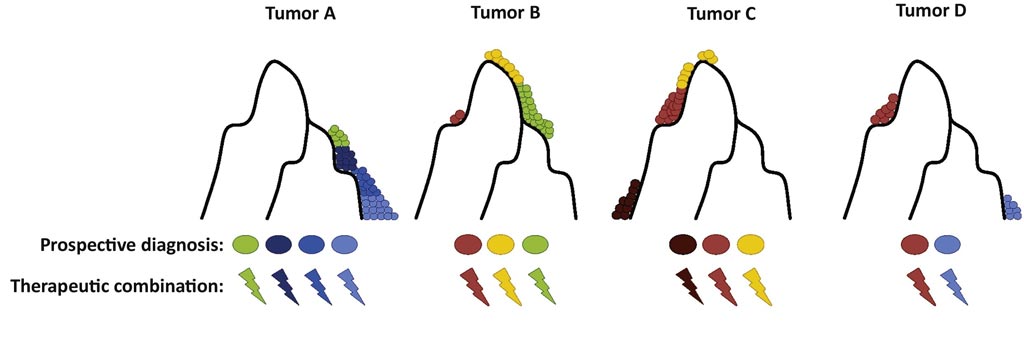Single-Cell Diagnostics Advocated for Breast Cancer Subtyping
By LabMedica International staff writers
Posted on 06 Nov 2017
In an opinion article based their analysis of studies, two medical researchers argue that women diagnosed with breast cancer (BC) would likely benefit from treatment based also on identifying the molecular subtype of different cells within their tumors, in addition to current molecular and histopathology testing of collections of tumor cells.Posted on 06 Nov 2017
They discuss the growing consensus that a tumor can have cells of multiple origins and respond variably to treatment. The authors advocate for development of more accurate diagnostics to capture molecular irregularities between cells within a tumor.

Image: An illustration of individual breast cancer tumors (Tumors A–D) with cells in varying differentiation states (shown in different colors) within a tumor (Image courtesy of Yeo SK and Guan J-L / Trends in Cancer).
"Breast tumors are moving targets because they are really versatile," said Jun-Lin Guan, professor at University of Cincinnati College of Medicine (Cincinnati, OH; USA), who co-authored the paper with postdoctoral fellow Syn Kok Yeo, "If you use a treatment that's targeting one subtype, which kills one type of breast cancer, often the other kind will actually expand. That defeats the purpose of treatment."
BC cells differ by the types of molecular markers (genetic or biochemical, some of which are found on their surface) that physicians can have tested to understand the characteristics of a patient's cancer to help devise an optimal treatment strategy. For example, women with the HER2+ BC subtype generally have a poorer prognosis than those with the luminal A tumors because of how quickly the cells multiply. Often tumor samples are taken and screened for the most common markers present, but Prof. Guan and Dr. Yeo's analysis of human and rodent studies raises the possibility that overlapping subtypes are being missed.
The researchers put forward the hypothesis that the co-existence of distinct BC subtypes within tumors happens because a fraction of BC cells retain many stem cell -like qualities and thus reserve the capability to easily change. This has been observed in human cancer cells and in rodent studies but has yet to be confirmed in patients. Single-cell analysis could assess whether this problem is common or rare in humans.
They advocate for diagnostic testing to be combined with single-cell technologies, in which individual cells are screened (via mass spectrometry, DNA sequencing, etc) for molecular markers. However, single-cell approaches are currently expensive and require specialized expertise, so they are not yet realistic for regular patient screenings.
"What we're talking about is still not widely used in practice--there's a gap between basic cancer research and the clinics that do the diagnoses," Prof. Guan said, "However, single-cell technologies are advancing very quickly, so it's possible that we can see them being used in the near future."
The paper, by Yeo SK and Guan J-L, was published October 24, 2017, in the journal Trends in Cancer.
Related Links:
University of Cincinnati College of Medicine













